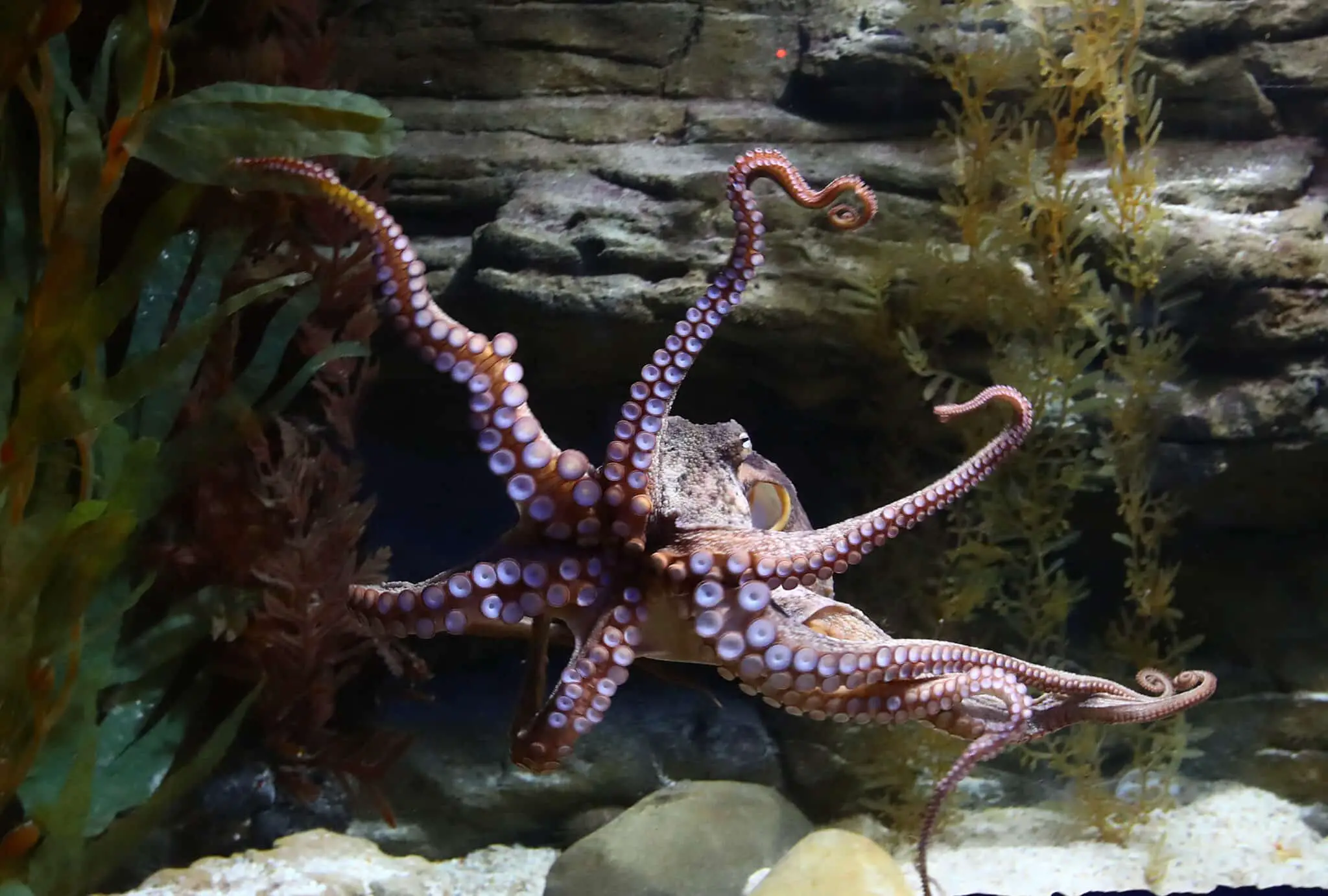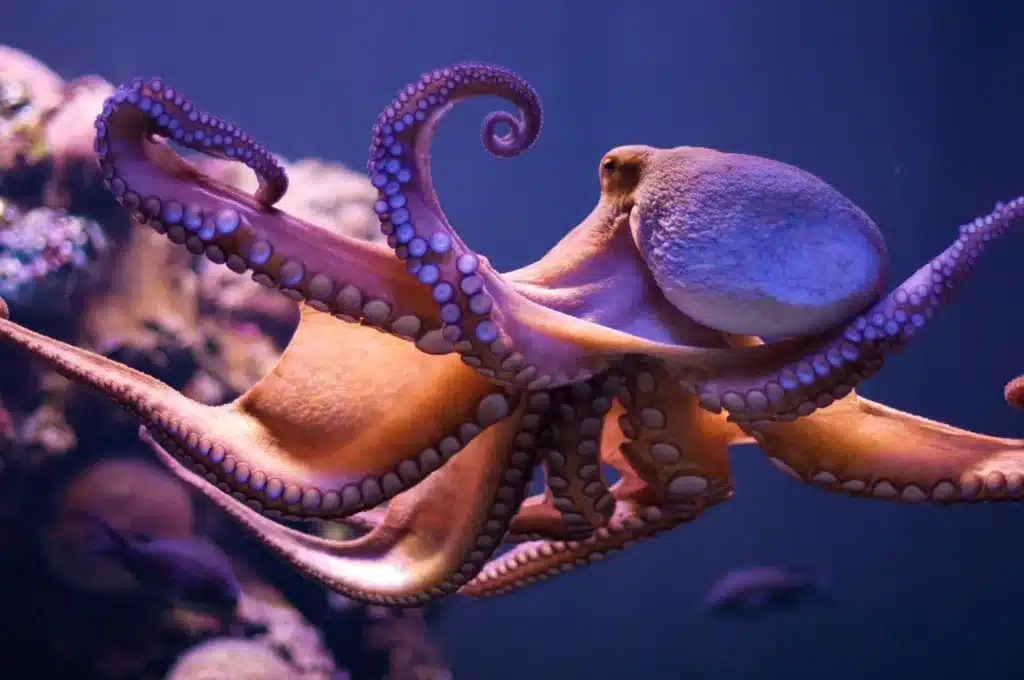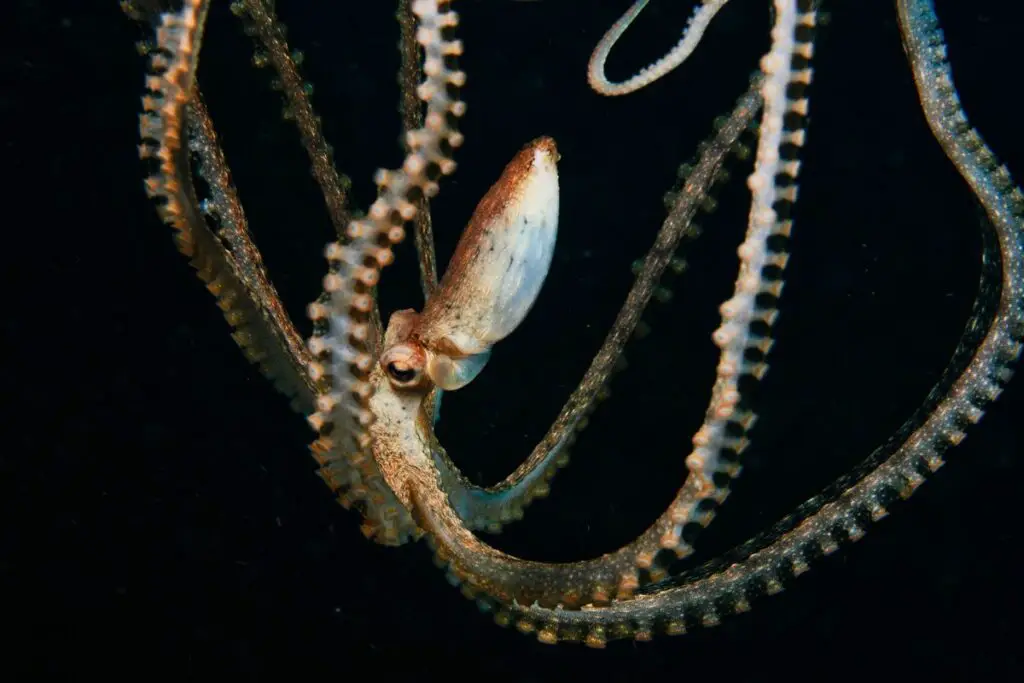Are Octopus Smarter Than Dolphins

Introduction
Are Octopus Smarter Than Dolphins: Octopuses, with their flexible, dexterous limbs and incredible problem-solving skills, have earned a reputation as some of the ocean’s most intelligent inhabitants. They exhibit a remarkable ability to navigate mazes, open jars, and mimic other animals, all while displaying an uncanny capacity for learning and adaptation. But are they truly smarter than dolphins.
Dolphins, celebrated for their intricate social structures and intricate language, have long been considered one of the most intelligent species on Earth. They exhibit remarkable problem-solving skills and are capable of advanced feats of memory and learning. Their ability to work together in coordinated hunting and to communicate using a diverse range of vocalizations raises intriguing questions about the nature of their intelligence.
We delve into the world of these marine marvels, examining the evidence and theories surrounding their intelligence. Are octopuses, with their solitary and highly adaptable lifestyles, truly smarter than dolphins, we embark on a journey through the depths of the ocean, seeking to unravel the mysteries of these remarkable creatures and their extraordinary minds.

Why is dolphin smarter than octopus?
Dolphins vs Octopus
While both dolphins and octopuses are known for their problem-solving abilities, dolphins have a more complex social structure and are better adapted to their environment. Octopuses are solitary creatures and do not have the same level of social intelligence as dolphins.
While both dolphins and octopuses are remarkable creatures with their own unique forms of intelligence, some arguments support the notion that dolphins are considered smarter than octopuses from certain perspectives.
- Social Complexity: Dolphins are highly social animals, living in pods with complex hierarchies. Their ability to cooperate and communicate within these groups is extraordinary. They exhibit a wide range of vocalizations and even signature whistles, suggesting advanced social cognition. Octopuses, in contrast, are primarily solitary creatures and lack the intricate social structures seen in dolphins.
- Tool Use and Problem-Solving: Dolphins have been observed using tools, such as sponges, to protect their rostrums (snouts) while foraging on the seafloor. They also engage in cooperative hunting strategies. Octopuses exhibit problem-solving skills but are generally solitary hunters and lack the same level of tool use observed in dolphins.
- Learning and Memory: Dolphins display impressive learning abilities and have demonstrated long-term memory. They can recognize themselves in mirrors, follow complex commands, and remember individuals for years. Octopuses also show learning capabilities, but their shorter lifespans may limit the scope of their long-term memory.
- Communication: While octopuses communicate through visual displays and chromatophore color changes, dolphins have a more diverse and sophisticated array of vocalizations and body language, allowing for more nuanced communication within their social groups.
It’s important to note that intelligence is multifaceted, and comparing species can be challenging due to their diverse adaptations. While dolphins may excel in certain areas, octopuses’ intelligence is equally remarkable but tailored to their solitary, cephalopod lifestyles. Both species showcase the awe-inspiring diversity of intelligence in the animal kingdom.
Why are octopuses considered intelligent like monkeys and dolphins?
They can use tools. Tools use is relatively rare in the animal kingdom and is something we tend to associate with apes, monkeys, dolphins and some birds (particularly crows and parrots). It is a good indicator of the ability to learn. Among invertebrates, only octopuses and a few insects are known to use tools.
Octopuses are hailed as one of the most intelligent creatures in the ocean, alongside primates and dolphins. Their remarkable cognitive abilities have fascinated scientists and marine enthusiasts alike. Much of this acclaim stems from their complex nervous systems and behaviors, which rival those of more commonly recognized intelligent animals.
Octopuses exhibit an array of impressive skills. They are adept problem solvers, capable of intricate tasks such as opening jars to access food. This demonstrates a level of dexterity and strategic thinking akin to that of monkeys. Octopuses have demonstrated an uncanny ability to learn and adapt. They can memorize mazes, differentiate between shapes, and even mimic other marine species for camouflage.
Their intelligence is further highlighted by their capacity for tool use. Octopuses have been observed employing coconut shells and rocks as protective shields or to create dens, showcasing a sophisticated understanding of their environment. Additionally, their complex communication methods, involving a repertoire of color changes, postures, and body language, indicate a nuanced social intelligence.
How is the octopus the most intelligent?
Yet octopuses are extremely intelligent, with a larger brain for their body size than all animals except birds and mammals. They are capable of high-order cognitive behaviors, including tool use and problem-solving, even figuring out how to unscrew jar lids to access food.
The octopus stands out as one of the most intelligent creatures in the animal kingdom, thanks to its extraordinary cognitive capabilities. What sets the octopus apart is its highly developed nervous system, which boasts an impressive number of neurons, comparable to that of certain vertebrates. This neural complexity enables the octopus to process information and exhibit a level of problem-solving that rivals even some mammals.
One of the most compelling demonstrations of octopus intelligence lies in their problem-solving prowess. They exhibit an exceptional ability to navigate mazes, manipulate objects, and even dismantle complex enclosures to access food. This showcases a remarkable blend of dexterity, spatial awareness, and strategic thinking.
Moreover, octopuses display an astonishing capacity for learning and adaptation. They can memorize and recognize patterns, enabling them to adjust their behaviors in response to changing circumstances. This adaptability is further underscored by their ability to mimic other marine species, a remarkable feat of camouflage that speaks to their acute environmental awareness.
Octopuses engage in a sophisticated form of communication, utilizing an array of color changes, postures, and gestures to convey their intentions and emotions. This indicates a level of social intelligence and a nuanced understanding of their interactions with conspecifics and the environment.
Are octopus more intelligent than other animals?
In particular, the Coleoidea subclass (cuttlefish, squid, and octopuses) is thought to be the most intelligent invertebrates and an important example of advanced cognitive evolution in animals, though nautilus intelligence is also a subject of growing interest among zoologists.
The intelligence of octopuses is exceptional, making them stand out among other animals. Their level of cognitive prowess is comparable to, if not surpassing, that of many vertebrates. Octopuses possess remarkably large and sophisticated nervous systems, with a significant concentration of neurons distributed throughout their bodies. This neural architecture allows them to process information, learn, and adapt in ways that rival some of the most intelligent creatures on Earth.
What truly distinguishes octopuses is their problem-solving ability. They excel at complex tasks, such as opening jars or navigating intricate mazes, demonstrating a high degree of dexterity and strategic thinking. Their capacity for learning is also remarkable; octopuses can acquire and apply knowledge rapidly, adjusting their behaviors in response to new challenges.
While it’s challenging to definitively assert whether octopuses are more intelligent than all other animals, their unique combination of problem-solving skills, adaptability, and learning capabilities certainly places them among the most intellectually impressive creatures on the planet. Their exceptional cognitive abilities continue to intrigue and inspire scientists, shedding light on the diverse manifestations of intelligence in the animal kingdom.
What are some intelligent facts about octopus?
Smarts. Octopuses are standouts among cephalopods, and among all invertebrates, for their large brains. They can navigate mazes, solve problems, remember, predict, use tools and take apart just about anything from a crab to a lock—all but that last one sophisticated hunting behaviors.
Octopuses are awe-inspiring creatures with a wealth of intelligent adaptations. Their advanced nervous systems, containing an estimated 500 million neurons, contribute to their exceptional cognitive abilities. This is more than some vertebrates, underlining their remarkable intellectual capacity.
One of the most astounding features of octopuses is their problem-solving prowess. They have been observed tackling intricate challenges, such as unscrewing jars to access food, showcasing an impressive level of dexterity and cognitive flexibility. This ability to navigate complex environments and interact with objects is akin to the problem-solving skills exhibited by certain primates.
Octopuses are also fast learners. They demonstrate a remarkable ability to acquire new information and adapt their behavior accordingly. This adaptability is further emphasized by their capacity to rapidly change color and texture, an ingenious camouflage technique used for both hunting and avoiding predators.
Moreover, octopuses display a degree of social intelligence, as evidenced by their complex communication methods. They utilize an array of body postures, color changes, and movements to convey intentions and emotions. This indicates a nuanced understanding of social dynamics within their species.
Are octopus smarter than dolphins?
Comparing the intelligence of octopuses and dolphins is a complex task, as their cognitive abilities have evolved in vastly different environments. Octopuses are considered exceptionally intelligent in their own right. They possess intricate nervous systems with a large number of neurons, rivaling some vertebrates. Their problem-solving skills and adaptability to new situations are impressive, as evidenced by their ability to navigate mazes and manipulate objects.
Dolphins, on the other hand, are renowned for their social complexity and advanced communication skills. They exhibit intricate cooperative behaviors, have a sophisticated system of vocalizations, and are capable of understanding complex commands from trainers. Additionally, dolphins demonstrate a high level of self-awareness, as seen in mirror self-recognition tests.
In terms of sheer brain size, dolphins possess larger brains relative to their body size than octopuses, which suggests a high cognitive capacity. However, it’s important to note that intelligence manifests in various forms and is influenced by an animal’s ecological niche.
Determining whether octopuses are “smarter” than dolphins depends on the specific criteria used to evaluate intelligence. Each species excels in its own unique way, shaped by its evolutionary history and environment. Both octopuses and dolphins offer intriguing insights into the diverse expressions of intelligence in the animal kingdom.
Can octopuses and dolphins communicate with humans?
Octopuses and dolphins, two of the most intelligent and enigmatic creatures in the ocean, have sparked curiosity about their ability to communicate with humans. While they possess vastly different evolutionary backgrounds and forms of communication, both species have exhibited intriguing behaviors that suggest a level of interaction with humans.
Dolphins, with their complex social structures and advanced cognitive abilities, have been known to engage in communication attempts with humans. They can respond to commands, mimic human sounds, and even understand symbol-based languages developed for cross-species communication. Their use of clicks, whistles, and body language makes them highly effective communicators within their own communities, and they seem to extend this adaptability to interactions with humans.
Octopuses, on the other hand, have a completely different communication toolkit. They lack the vocal apparatus of dolphins and primarily rely on visual displays, body postures, and chromatophores (color-changing cells) to convey emotions and intentions. While their communication may not be as obvious to us, octopuses have displayed remarkable problem-solving abilities and an aptitude for understanding and reacting to their environment.
While the extent of human-octopus and human-dolphin communication remains a topic of ongoing research, there’s no doubt that these creatures possess remarkable intelligence and adaptability, allowing for intriguing interactions and the potential for a deeper understanding of interspecies communication in the future.
Can octopuses recognize themselves in mirrors like dolphins can?
The ability of animals to recognize themselves in mirrors is considered a marker of self-awareness and cognitive sophistication. Dolphins are known to exhibit this remarkable trait, indicating a high level of self-awareness and intelligence. However, the case for octopuses recognizing themselves in mirrors is not as clear-cut.
Dolphin species like bottlenose dolphins have been extensively studied in mirror self-recognition experiments. They display behaviors such as investigating their own bodies, making unique movements, and even using the mirror to inspect hidden body parts, all of which suggest they recognize themselves as distinct individuals.
In contrast, octopuses have not shown the same level of mirror self-recognition. Their response to mirrors is often defensive or exploratory, but it does not necessarily indicate self-awareness. Octopuses have complex nervous systems and exhibit problem-solving skills, but their interactions with mirrors seem driven more by curiosity about an unfamiliar object rather than self-identification.
While dolphins have provided compelling evidence of mirror self-recognition, octopuses’ behavior in front of mirrors remains a subject of ongoing research. It’s possible that their unique physiology and cognitive processes may lead to different responses compared to mammals like dolphins. To date, conclusive evidence of mirror self-recognition in octopuses is still awaited, leaving this fascinating question unanswered.

Conclusion
Octopuses dazzle us with their solitary problem-solving abilities, remarkable adaptability, and the astonishing flexibility of their bodies. Their capacity to navigate intricate mazes, manipulate objects, and even mimic other creatures highlights their exceptional cognitive prowess. These solitary cephalopods have evolved to excel in tasks that require individual ingenuity and resourcefulness.
On the other hand, dolphins captivate us with their intricate social structures, highly developed communication skills, and cooperative behaviors. Their ability to work as a team in complex hunting strategies and their sophisticated use of vocalizations for communication demonstrate their intelligence in a social context.
Ultimately, comparing the intelligence of octopuses and dolphins is a bit like comparing apples and oranges; their cognitive abilities have evolved to suit their respective lifestyles and ecological niches. Rather than seeking to rank them in a hierarchy of intelligence, we should celebrate the incredible diversity of cognitive abilities that have arisen in the animal kingdom. Octopuses and dolphins are both shining examples of the wondrous ways in which life on Earth has adapted and thrived in the vast and mysterious realm of ocean acidification.



